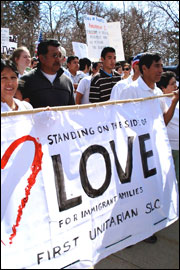Congregations as allies
How three Unitarian Universalist congregations are pursuing immigration justice.
Unitarian Universalist Congregation of Danbury, Connecticut
At 8 a.m. every Friday, in all weather, members of the Danbury church turn out in Kennedy Park, an urban concrete expanse that’s more parking lot than park. That’s where undocumented laborers wait, hoping someone will hire them for a short-term job, maybe in landscaping, construction, or cleanup. Church members bring the workers coffee, gloves, socks, bottled water, and pamphlets explaining their rights and resources for food, medical, and legal help.
In the late afternoon, church members return and run a food pantry across the street, where workers stop in if they don’t get a job. Many women and children also come after school.
The Danbury congregation has been ministering to immigrants since 2005, when an anti-immigration group targeted the city, gaining the support of Mayor Mark Boughton. “We couldn’t not get involved,” says Lynn Taborsak, Social Action Committee co-chair and a former state representative. “Danbury was a hotbed of prejudice against immigrants in 2005 and 2006.”
About a third of the 150-member church now works on immigration ministry in some way. The church has invited immigrants to speak, held a resource fair, testified in support of the May 2011 passage of Connecticut’s DREAM Act, and organized immigrants from Danbury to march in 2010 in Washington, D.C. In 2008 members overwhelmingly voted to join the New Sanctuary Movement to support immigrant rights, the only congregation of any kind in Connecticut to do so.
First Unitarian Universalist Church of Columbus, Ohio
In Columbus, the call for immigration justice came from the children.
At a Justice Sunday in spring 2010, Jolinda Stephens, director of religious education, tried to explain Arizona’s Senate Bill 1070, which gives police broad power to arrest anyone suspected of being in the country illegally. The children were outraged by the idea that parents could be separated from their children without warning.
“I spent a lot of time trying to convince them the people of Arizona were not evil,” says Stephens, who was one of twenty-nine UUs arrested in Arizona in July 2010 for civil disobedience on the day SB 1070 took effect. She says she went for her religious education students and great-grandchildren.
The RE program has spent two years studying and working on immigration—interviewing immigrants, staging a flash mob, distributing pamphlets to immigrant-owned businesses on what to do if you’re stopped, planning a youth conference on immigration. Two of the church’s young adults reported back on their work with No More Deaths in Arizona.
The rest of the congregation has come on board, too, joining in interfaith services and rallies, showing a film series, studying the UUA’s six-week course on immigration, joining with local partner groups, and speaking in the community.
Unitarian Universalist Church of Boulder, Colorado
The Boulder church has a situation similar to First Universalist’s in Denver: Ryan Scherenberg, the 19-year-old granddaughter of longtime UU leaders Barbara Richards and Fred Cole, is married to a young undocumented man undergoing deportation, Moises Rodriguez Luis, whose family brought him to Colorado at age ten. The couple is expecting a son and knows no one in Mexico. Colorado UUs have offered to apply what they learned in the Raúl Cárdenas case, but for now, Rodriguez’s lawyer is advising a lower profile.
The Boulder church is also taking a slower approach. Leaders want to explore how the church can act from its religious principles, in ways that are different from what other political-action groups do. “Our focus is companioning, using the model of being with people who have an illness or are dying, and applying that to any group that is struggling,” says Virginia Jenkins, a graduate student in counseling at the Naropa Institute.
The group focuses on spiritual practices such as meditation or music or art, then listening to a member tell a personal story that relates to immigration. It has hosted several events: a lunch prepared by and shared with local immigrant women, a performance by a playback theatre group to dramatize their stories, and a baby shower for Ryan and Moises.
See sidebar for links to related resources.
Comments powered by Disqus







